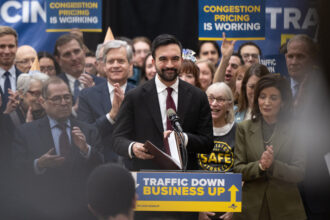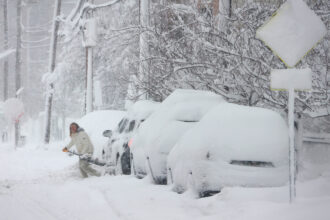Congressman Ed Markey hinted today at how CO2 emissions allowances might be divvied up under a national cap-and-trade program. He also spelled out a strong incentive for detractors in Congress to change their tune – three letters: EPA.
Markey, the chairman of the House Energy and Environment Subcommittee and one of the architects of the comprehensive climate bill headed for Congress, was speaking at a symposium on climate legislation at MIT along with President Obama’s chief advisor on energy and climate change, Carol Browner, and presidential science advisor John Holdren.
An audience member asked how quickly the proposed cap-and-trade program would reach 100 percent auction of the emissions allowances.
Markey’s answer made it clear that cap-and-trade won’t start with a 100 percent auction and that the Obama administration is concerned about the impact on competitive trade, particularly when it comes to China:
“Initially, at least, we have to set aside a certain amount of the carbon credits to ensure that the steel, the paper and other trade-sensitive, energy-intensive industries are not exploited in the near term by the Chinese and others in terms of them taking advantage of this increased cost.
"Right off the top, we cannot auction off all those credits.”
A 100 percent auction is the long-term goal, Markey said, but he said the members of Congress and the administration who have been shaping the legislation are being mindful of the law of unintended consequences.
For example, the structure has to protect consumers from high prices, he said. Markey didn’t elaborate on how consumers would be protected, but that could mean pulling elements from his 2008 iCAP proposal, which proposed returning over half the auction proceeds to low- and middle-income consumers, or Rep. Chris Van Hollen‘s (D-Md.) current bill, which proposes refunding the full allowance auction proceeds directly to the American taxpayers.
Getting enough congressional support for cap-and-trade, particularly from coal and industrial state lawmakers, will partly hinge on how carbon allowances are allocated. So far, though, the draft climate legislation that Markey (D-Mass.) and Rep. Henry Waxman (D-Calif.) proposed last week only frames the cap-and-trade mechanism – the congressmen left details about the distribution of emissions allowances to be determined by their committees as they hash out the legislation starting next week.
The only consensus on the proper allowance mix seems to be that there is no consensus. Power producers and industries are demanding free allowances. The president, from the opposite end of the spectrum, has called for quickly getting to a 100 percent auction. In the middle, the business-NGO U.S. Climate Action Partnership, which Waxman and Markey used as a foundation for much of their bill, has suggested giving away 40 percent of the allowances at first, then decreasing the freebies over time.
One thing is clear: Not passing any form of climate legislation this year will have consequences for Congress.
Later this week, EPA Administrator Lisa Jackson expects to announce a formal declaration that CO2 emissions endanger the public health and welfare. That endangerment finding, in response to a two-year-old U.S. Supreme Court decision, opens the door to regulation of greenhouse gas emissions from automobiles and other sources.
“Lisa Jackson has already made a determination that she wants to move forward on this endangerment finding,” Markey said today. “Now you have a choice if you’re in Congress. Do you want the EPA to make the decision or do you want your congressman and senator to be in the room drafting legislation?
"We think this is a helpful development. It focuses the minds of industry and congressmen and senators.”
As Barbara Boxer (D-Calif.) likes to remind her colleagues in the Senate, inaction by Congress means the EPA will be doing their work for them, and they might not like the results. The Waxman-Markey bill throws opponents a bone by limiting some of the EPA’s regulatory leeway, particularly on CO2.
Browner, who has been negotiating with congressional staff to work out disagreements over the comprehensive climate legislation, was more reserved when asked about the EPA’s role, but she said:
“I am very confident that Congress is going to act. … It is the strong preference of the administration that we secure legislation. There are things that can be done in legislation that won’t quite work within existing law.”
The Clean Air Act, EPA’s basis for action, can be unwieldy and is more open to litigation, which can tie up action for years. The Waxman-Markey bill would be setting stringent standards into law rather than leaving them to regulation, including limiting coal-fired power plants to emissions of 1,100 pounds of CO2 per megawatt-hour starting in 2015.
Hearings on the 648-page Waxman-Markey bill start next week, with EPA Administrator Lisa Jackson and Energy Secretary Steven Chu slated to testify. By then, Jackson will likely have issued the endangerment finding, raising the stakes for Congressional action.
See also:
House Climate Bill a Centrist Balancing Act
Memo to Obama: Make Carbon Cap Simple and Unsinkable
Cap-and-Trade is Carbon Capitalism, So Why Do Capitalists Hate It?
About This Story
Perhaps you noticed: This story, like all the news we publish, is free to read. That’s because Inside Climate News is a 501c3 nonprofit organization. We do not charge a subscription fee, lock our news behind a paywall, or clutter our website with ads. We make our news on climate and the environment freely available to you and anyone who wants it.
That’s not all. We also share our news for free with scores of other media organizations around the country. Many of them can’t afford to do environmental journalism of their own. We’ve built bureaus from coast to coast to report local stories, collaborate with local newsrooms and co-publish articles so that this vital work is shared as widely as possible.
Two of us launched ICN in 2007. Six years later we earned a Pulitzer Prize for National Reporting, and now we run the oldest and largest dedicated climate newsroom in the nation. We tell the story in all its complexity. We hold polluters accountable. We expose environmental injustice. We debunk misinformation. We scrutinize solutions and inspire action.
Donations from readers like you fund every aspect of what we do. If you don’t already, will you support our ongoing work, our reporting on the biggest crisis facing our planet, and help us reach even more readers in more places?
Please take a moment to make a tax-deductible donation. Every one of them makes a difference.
Thank you,












